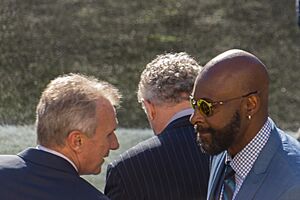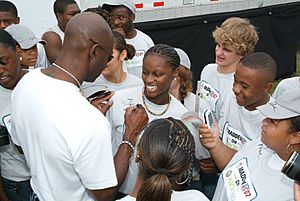Jerry Rice facts for kids
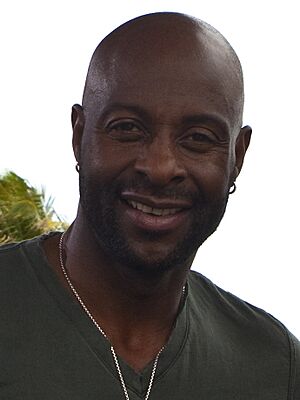
Rice in 2010
|
|||||||
| No. 80 | |||||||
|---|---|---|---|---|---|---|---|
| Position: | Wide receiver | ||||||
| Personal information | |||||||
| Born: | October 13, 1962 Starkville, Mississippi, U.S. |
||||||
| Height: | 6 ft 2 in (1.88 m) | ||||||
| Weight: | 200 lb (91 kg) | ||||||
| Career information | |||||||
| High school: | B. L. Moor (Oktoc, Mississippi) |
||||||
| College: | Mississippi Valley State (1981–1984) | ||||||
| NFL Draft: | 1985 / Round: 1 / Pick: 16 | ||||||
| Career history | |||||||
|
|||||||
| Career highlights and awards | |||||||
|
|||||||
| Career NFL statistics | |||||||
|
|||||||
| Player stats at PFR | |||||||
|
Pro Football Hall of Fame
|
|||||||
|
College Football Hall of Fame
|
|||||||
Jerry Lee Rice (born October 13, 1962) is a former American football wide receiver who played for 20 seasons in the National Football League (NFL). Many people call him the greatest wide receiver of all time. He is also thought to be one of the best players in NFL history.
Rice won three Super Bowl championships with the San Francisco 49ers. He later played for the Oakland Raiders and Seattle Seahawks. He holds many NFL records, including the most career receptions, receiving yards, and touchdowns. In 2010, the NFL Network named him the greatest player in the history of the league.
He played college football at Mississippi Valley State, where he set many records. The 49ers chose him in the 1985 NFL draft. He became famous for his amazing partnership with quarterbacks Joe Montana and Steve Young. Rice was chosen for the Pro Bowl 13 times and was inducted into the Pro Football Hall of Fame in 2010.
Contents
Early Life and High School
Jerry Lee Rice was born in Starkville, Mississippi, and grew up in the small town of Crawford. His father, Joe, was a brick mason who built houses by hand. Jerry and his brothers often helped their father by catching bricks that were tossed up to them. This taught him the value of hard work and helped develop his famous catching ability.
Rice did not play football his first year of high school because his mother thought it was too rough. One day, he was skipping class and ran away when the principal tried to catch him. The principal was so impressed by his speed that he told the football coach. The coach offered Rice a spot on the team, and his mother finally agreed.
In high school, Rice played several positions but was best as a wide receiver. He became an all-state player and was known for his great plays with the team's quarterback, Willie Gillespie. They were nicknamed after the famous NFL duo Johnny Unitas and Raymond Berry.
College Football Stardom
Rice attended Mississippi Valley State University from 1981 to 1984. In college, he teamed up with quarterback Willie Totten. Together, they were known as "The Satellite Express." The team had a unique offense where they often lined up four wide receivers on one side of the field.
In his junior year, Rice set NCAA records for receptions (102) and receiving yards (1,450). He earned the nickname "World" because it seemed like he could catch any ball thrown near him. As a senior, he broke his own records and set a new NCAA record with 27 touchdown receptions in one season.
By the end of his college career, Rice had broken 18 NCAA records. In his honor, the university later renamed its football stadium to Rice–Totten Stadium. In 2006, he was inducted into the College Football Hall of Fame.
A Legendary NFL Career
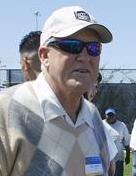
Rice's amazing college performance got the attention of the NFL. The San Francisco 49ers and their coach, Bill Walsh, were very interested in him. The 49ers traded up in the 1985 NFL draft to select Rice with the 16th pick.
Glory with the 49ers
Rice's rookie season in 1985 was good, but he truly became a star in his second year. In 1986, he led the league with 1,570 receiving yards and 15 touchdowns. This was the first of many seasons where he would lead the NFL in key stats.
In 1987, even though the season was shortened by a players' strike, Rice set an NFL record with 22 receiving touchdowns in just 12 games. This record stood for 20 years. He was named the NFL's Offensive Player of the Year.
Three Super Bowl Rings
With quarterback Joe Montana, Rice helped the 49ers become a dominant team. They won back-to-back championships in Super Bowl XXIII (1988) and Super Bowl XXIV (1989). In Super Bowl XXIII, Rice was named the Super Bowl MVP after a record-setting performance of 11 catches for 215 yards.
After Montana was injured, Steve Young became the quarterback. Rice and Young also formed a powerful duo. In 1994, they led the 49ers to another championship in Super Bowl XXIX. Rice caught 10 passes for 149 yards and three touchdowns in that game.
Record-Breaking Seasons
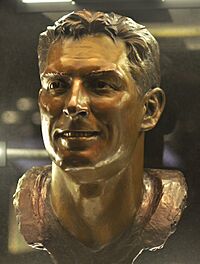
Throughout the 1990s, Rice continued to break records. In 1992, he broke the record for the most career receiving touchdowns. In 1995, he set a new NFL record for the most receiving yards in a single season with 1,848 yards. He also became the all-time leader in receptions and receiving yards that year.
In 1997, Rice suffered a major knee injury, forcing him to miss most of the season. It was the first time he had missed games due to injury in his entire career. He returned in 1998 and had another 1,000-yard season, proving he was still one of the best.
Later Career and Retirement
In 2001, after 16 seasons with the 49ers, Rice joined the Oakland Raiders. At age 39, he had another great season with over 1,100 receiving yards. In 2002, he helped the Raiders reach Super Bowl XXXVII, where they lost to the Tampa Bay Buccaneers.
After a few seasons with the Raiders, Rice was traded to the Seattle Seahawks in 2004. He played his final professional game with them. In 2005, he signed with the Denver Broncos but decided to retire before the season began.
In 2006, Rice signed a special one-day contract with the 49ers so he could officially retire as a member of the team where he became a legend. The 49ers retired his No. 80 jersey in his honor.
Legacy and Records
Jerry Rice is widely considered the greatest wide receiver in NFL history. His hard work and dedication were legendary. He was famous for his intense offseason workouts, including running up a steep hill he called "The Hill."
Rice holds many major NFL records, including:
- Most career receptions (1,549)
- Most career receiving yards (22,895)
- Most career touchdown receptions (197)
- Most career total touchdowns (208)
- Most career Super Bowl receptions (33), receiving yards (589), and touchdowns (8)
His records are so far ahead of other players that many experts believe they will never be broken. In 2010, he was inducted into the Pro Football Hall of Fame on his first try.
Life After Football
After retiring, Rice has stayed active. He appeared on the TV show Dancing with the Stars, where he finished in second place. He has also written books about his life and career.
Rice is also an avid golfer and has played in professional tournaments. He remains a beloved figure in sports and continues to be involved with the NFL, serving as a team captain in the Pro Bowl.
He was married to Jacqueline Mitchell from 1987 to 2009, and they have three children. He married Latisha Pelayo in 2019. His son, Jerry Rice Jr., also played college football. Another son, Brenden Rice, is currently a college football player.
See also
 In Spanish: Jerry Rice para niños
In Spanish: Jerry Rice para niños
 | Mary Eliza Mahoney |
 | Susie King Taylor |
 | Ida Gray |
 | Eliza Ann Grier |


